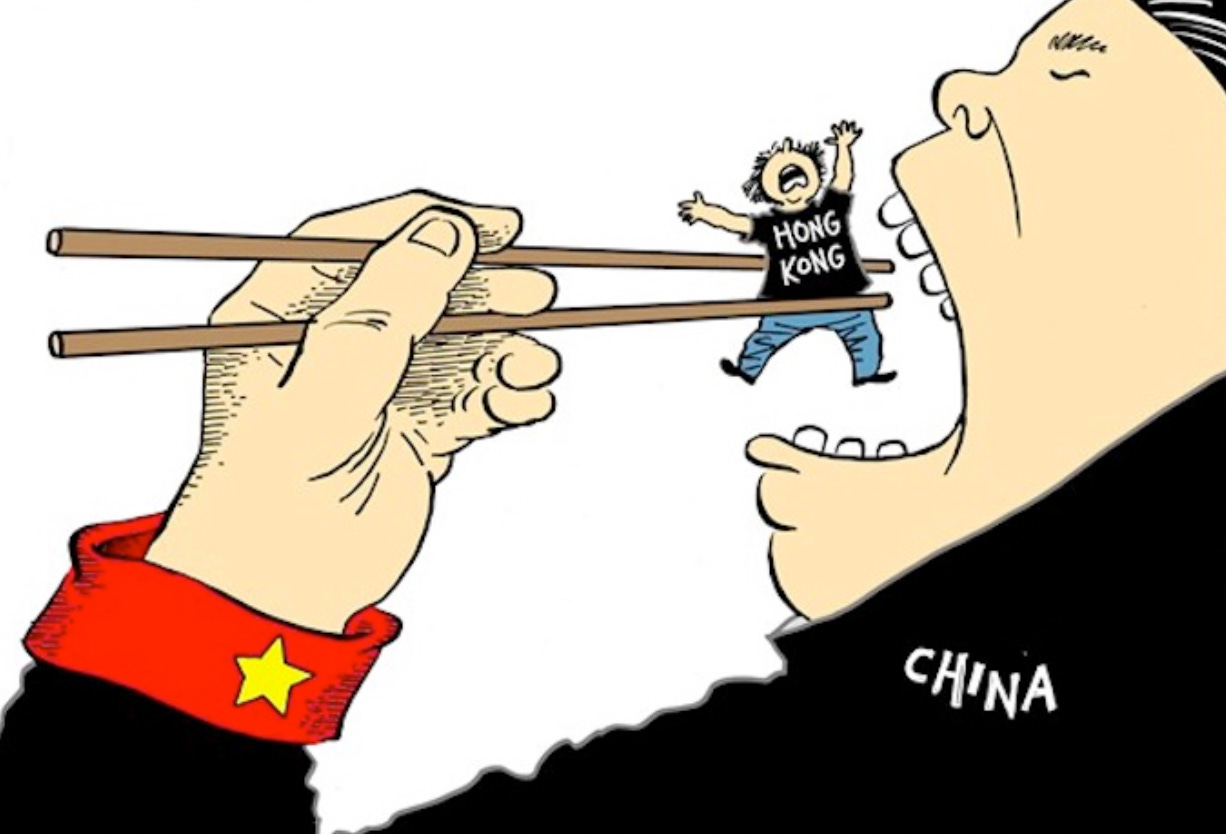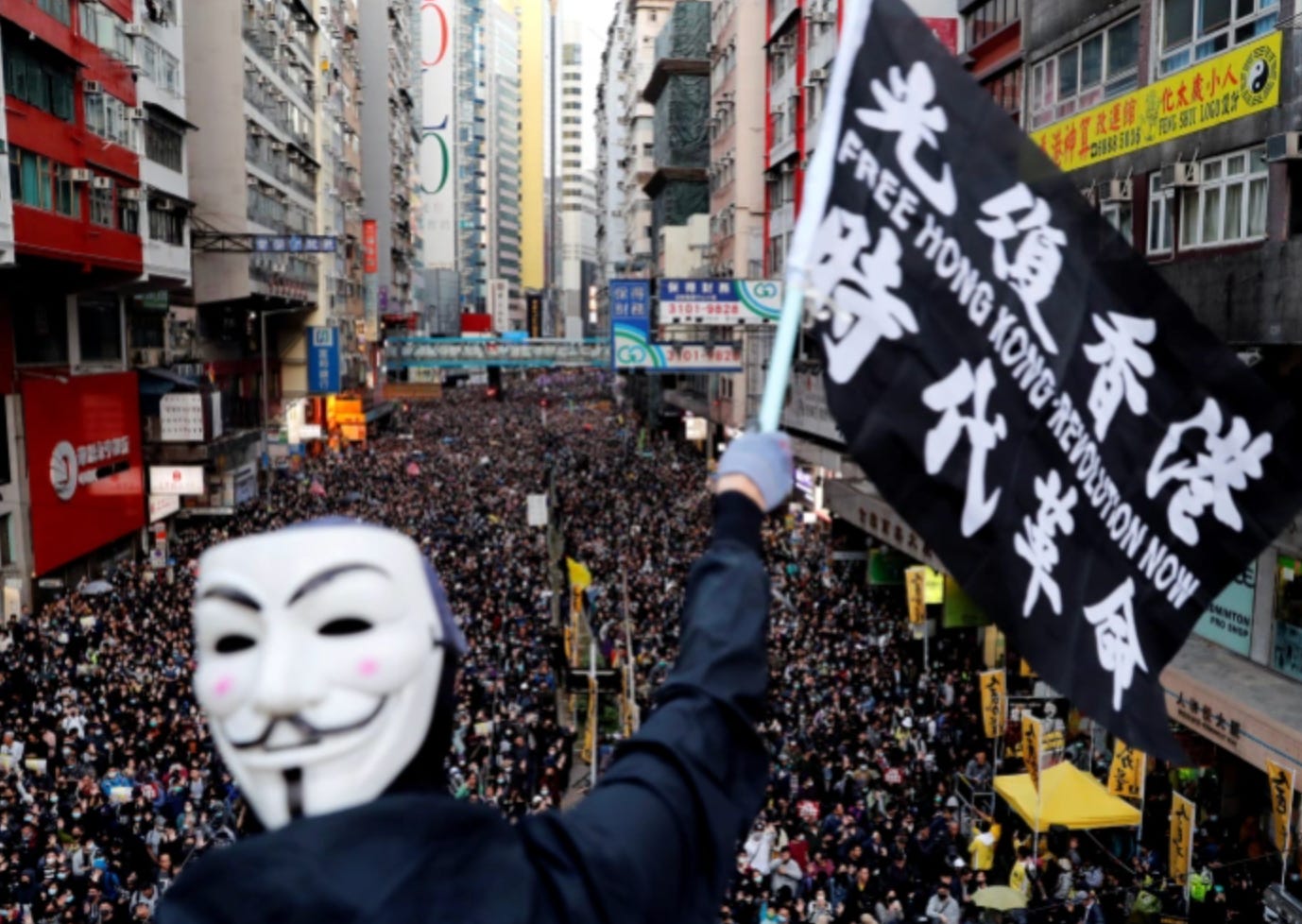At midnight on July 1, 1997, I was on a Chinese junk bobbing around in Victoria Harbour as the Royal Yacht Britannia steamed out of Hong Kong marking the handover to China of Hong Kong after 150 years of rule. There wasn’t a dry eye anywhere — for Brits, expats, investment bankers or the colony’s Chinese residents — despite Beijing’s promise to protect democracy and the rule of law until 2047. It was a new model of governance that would hopefully eventually be adopted by mainland China. But nobody believed the “one country, two systems” pledge and the handover became a takeover. And 25 years later, on July 1, China’s President Xi Jinping triumphantly paid a visit to the former colony for the first time and claimed that “there was no need to change a good system” and that “political power was for patriots” … His patriots, that is.
By contrast, on that anniversary, Britain’s last Governor, Chris Patten decried Beijing’s broken promises to Hong Kong and the world were “heartbreaking”, with justification. Today, the city of 7.4 million continues to suffer a brain drain and capital outflow. Meanwhile, other financial capitals, in the region and around the world, continue to slowly gain at its expense because the People’s Republic of China is neither a republic nor the people’s. It has stultified the once-vibrant place.
Hong Kong’s democracy is a sham, dissent is illegal and protesters remain in jail for years, its legislature is a rubber stamp and its free press and civil society have been dismantled. At the anniversary ceremony, Xi announced the appointment of a controversial and hated former police chief as the city’s next Chief Executive. The departing executive gloated that “Hong Kong is as free as ever” but the facts are that the city has fallen to 148th in worldwide rankings for human rights and press freedom, according to Human Rights Watch.
Socially, the city is dramatically poorer and shabbier than it was in 1997. Rich people and businesses began departing before the handover and still do, replaced by impoverished workers from the mainland who have flooded in over the years. The gap between super rich and poor in the city is wider than ever. Housing has deteriorated for all and now hundreds of thousands are crammed into high-rise slums with apartments sub-divided into 12-by-4 foot “cage homes”, also known as “coffin cubicles”. As a British paper commented recently, Hong Kong has “slums where hundreds of thousands live — in a city with more Louis Vuitton shops than Paris.” Not surprisingly, both crime and disease flourish due to these conditions, and in March Hong Kong had the world’s highest death rate from Covid.
Any sizeable and exploited underclass spells future trouble, especially for a financial center. Substandard conditions spawn criminal activity and “gangsterism” and also, eventually, corruption — maladies that afflict all undemocratic jurisdictions. These are living conditions that repel traders and financiers seeking safety in terms of transactions and investments and social stability. Tyranny has also beset the city and the dissembling of rights by China sparked massive protests in 2014 and 2019 and was met with violent crackdowns and arrests. These events, plus the high profile arrest in 2020 of self-made billionaire and Hong Kong media mogul Jimmy Lai, hoisted red flags around the world signalling the city’s undesirability.
Lai’s story was notably upsetting. He was self-made and had founded Apple Daily and a media empire. He reported on, and supported, the 2014 “Umbrella Revolution” and subsequent “pro democracy” in 2019 protest involving two million people. And his sudden and brutal incarceration sent shock waves internationally and domestically. Lai, his two sons and six executives were arrested very publicly and 200 police raided their offices. Once Beijing’s most prominent critic, Lai has ever since rotted in a mainland jail since his arrest.
Hong Kong has been damaged, but won’t disappear as a financial center any time soon because it still remains the principal gateway to China, due to some ongoing advantages over Shanghai and others. For starters, it has been a trading center for two centuries and, secondly, there are strict controls over its separate convertible currency which is pegged to the U.S. dollar. This underpins the city as a secure conduit for Chinese investing abroad and also for foreigners investing in China. It is also a hub for money laundering and playground for wealthy Chinese officials and tycoons.
But it will continue to cede ground to others as a financial center because of the steady departure of people, caused by repression and China’s severe Covid lockdowns. In the first quarter of 2022, about 157,000 left out of a population of 7.4 million. Some of the richest left so quickly that they left behind expensive cars in parking garages, according to reports. More will do so. According to Hong Kong’s Public Opinion Research Institute, almost a quarter of the city’s residents have plans to leave. Another survey estimated half the European companies located there are considering leaving. The Hong Kong Chamber of Commerce warned another exodus of one million educated workers could leave in short order, the same number that fled before the 1997 handover. Two charts based on world opinion by investors reflect its falling importance between 2020 and 2025:
This downward trajectory will be enhanced as a result of Xi’s speech because he merely confirmed that Hong Kong’s “two systems” were capitalism and autocracy, not capitalism and democracy with the rule of law. It also reminded the world that Beijing reneged on its agreement with Britain, a treachery that further undermine trust among other nation-states that China is capitalistic, globally sensitive, and reliable. As Britain’s Patten put it: “China has ripped up the joint declaration and is vengefully and comprehensively trying to remove the freedoms of Hong Kong because it regards them as a threat.”
It’s seem more than 25 years ago when Hong Kong ebulliently welcomed a new era as nobody’s colony. But today the port is no longer a freewheeling, innovative, world class financial capital. It’s simply another Chinese city run by another ruthless government.
NOTE: Hit the Share button to send this to social media, but those who wish to email this newsletter to others can do so by forwarding it to another email or, if that doesn’t work, by copying it and pasting it onto another email then sending it in order to avoid the paywall.








Thank your for pointing out that Hong Kong demonstrates that capitalism and democracy are not synonymous. Simply favoring capitalism is not enough.
at least President Xi is now having to deal with domestic issues in Mainland China which in some small measure may keep him distracted. Major collapse of housing markets and a newly created class of citizen who has tasted some comforts that come with a bit of money. Previously this money was reserved for Party faithful. Not true today. Tough to govern nearly a Billion and one half people.